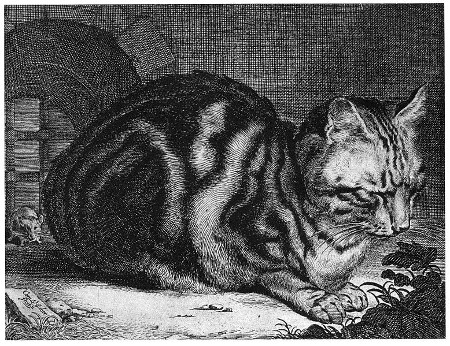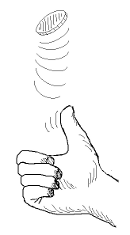Harry Mathews composed this limerick:
Young Dick, always eager to eat,
Denied stealing the fish eggs, whereat,
Caning him for a liar,
His pa ate the caviar
And left Dicky digesting the caveat.
Shouldn’t it rhyme?
Harry Mathews composed this limerick:
Young Dick, always eager to eat,
Denied stealing the fish eggs, whereat,
Caning him for a liar,
His pa ate the caviar
And left Dicky digesting the caveat.
Shouldn’t it rhyme?
Once there was a picket fence
Of interstitial excellence.
An architect much liked its look;
Protected by the dark he took
The interspaces from the slats
And built a set of modern flats.
The fence looked nothing as it should,
Since nothing twixt its pickets stood.
This artefact soon fated it,
The senate confiscated it,
And marked the architect to go
To Arctic — or Antarctico.
— Christian Morgenstern

For I will consider my Cat Jeoffry.
For he is the servant of the Living God, duly and daily serving him.
For at the first glance of the glory of God in the East he worships in his way.
For this is done by wreathing his body seven times round with elegant quickness.
For then he leaps up to catch the musk, which is the blessing of God upon his prayer.
For he rolls upon prank to work it in.
For having done duty and received blessing he begins to consider himself.
For this he performs in ten degrees.
For first he looks upon his fore-paws to see if they are clean.
For secondly he kicks up behind to clear away there.
For thirdly he works it upon stretch with the fore-paws extended.
For fourthly he sharpens his paws by wood.
For fifthly he washes himself.
For sixthly he rolls upon wash.
For seventhly he fleas himself, that he may not be interrupted upon the beat.
For eighthly he rubs himself against a post.
For ninthly he looks up for his instructions.
For tenthly he goes in quest of food.
For having consider’d God and himself he will consider his neighbour.
For if he meets another cat he will kiss her in kindness.
For when he takes his prey he plays with it to give it chance.
For one mouse in seven escapes by his dallying.
For when his day’s work is done his business more properly begins.
For [he] keeps the Lord’s watch in the night against the adversary.
For he counteracts the powers of darkness by his electrical skin & glaring eyes.
For he counteracts the Devil, who is death, by brisking about the life.
For in his morning orisons he loves the sun and the sun loves him.
For he is of the tribe of Tiger.
For the Cherub Cat is a term of the Angel Tiger.
For he has the subtlety and hissing of a serpent, which in goodness he suppresses.
For he will not do destruction, if he is well-fed, neither will he spit without provocation.
For he purrs in thankfulness, when God tells him he’s a good Cat.
For he is an instrument for the children to learn benevolence upon.
For every house is incomplete without him & a blessing is lacking in the spirit.
For the Lord commanded Moses concerning the cats at the departure of the Children of Israel from Egypt.
For every family had one cat at least in the bag.
For the English Cats are the best in Europe.
For he is the cleanest in the use of his forepaws of any quadruped.
For the dexterity of his defence is an instance of the love of God to him exceedingly.
For he is the quickest to his mark of any creature.
For he is tenacious of his point.
For he is a mixture of gravity and waggery.
For he knows that God is his Saviour.
For there is nothing sweeter than his peace when at rest.
For there is nothing brisker than his life when in motion.
For he is of the Lord’s poor and so indeed is he called by benevolence perpetually — Poor Jeoffry! poor Jeoffry! the rat has bit thy throat.
For I bless the name of the Lord Jesus that Jeoffry is better.
For the divine spirit comes about his body to sustain it in compleat cat.
For his tongue is exceeding pure so that it has in purity what it wants in music.
For he is docile and can learn certain things.
For he can set up with gravity, which is patience upon approbation.
For he can fetch and carry, which is patience in employment.
For he can jump over a stick, which is patience upon proof positive.
For he can spraggle upon waggle at the word of command.
For he can jump from an eminence into his master’s bosom.
For he can catch the cork and toss it again.
For he is hated by the hypocrite and miser.
For the former is afraid of detection.
For the latter refuses the charge.
For he camels his back to bear the first notion of business.
For he is good to think on, if a man would express himself neatly.
For he made a great figure in Egypt for his signal services.
For he killed the Ichneumon-rat very pernicious by land.
For his ears are so acute that they sting again.
For from this proceeds the passing quickness of his attention.
For by stroking of him I have found out electricity.
For I perceived God’s light about him both wax and fire.
For the Electrical fire is the spiritual substance, which God sends from heaven to sustain the bodies both of man and beast.
For God has blessed him in the variety of his movements.
For, though he cannot fly, he is an excellent clamberer.
For his motions upon the face of the earth are more than any other quadruped.
For he can tread to all the measures upon the music.
For he can swim for life.
For he can creep.
— From Christopher Smart’s Jubilate Agno, written between 1759 and 1763
Plumber is icumen in;
Bludie big tu-du.
Bloweth lampe, and showeth dampe,
And dripth the wud thru.
Bludie hel, boo-hoo!
Thawth drain, and runneth bath;
Saw sawth, and scruth scru;
Bull-kuk squirteth, leakë spurteth;
Wurry springeth up anew,
Boo-hoo, boo-hoo.
Tom Pugh, Tom Pugh, well plumbës thu, Tom Pugh;
Better job I naver nu.
Therefore will I cease boo-hoo,
Woorie not, but cry pooh-pooh,
Murie sing pooh-pooh, pooh-pooh,
Pooh-pooh!
— A.Y. Campbell

Whenever you’re called on to make up your mind
And you’re hampered by not having any,
The best way to solve the dilemma, you’ll find,
Is simply by flipping a penny.
No, not so that chance shall decide the affair
While you’re passively standing there moping;
But the moment the penny is up in the air
You suddenly know what you’re hoping.
— Piet Hein
“2 Poems,” by Tom King, from The Oulipo Compendium. I don’t know why these are so charming, but they are:
This Is Jist Ti Siy
by Tim King
I hivi iitin
thi plims
thit wiri in
thi icibix
ind which
yii wiri pribibli
siving
fir briikfist
Firgivi mi
thiy wiri diliciiis
si swiit
ind si cild
Thos Os Jost To Soy
by Tom Kong
O hovo ooton
tho ploms
thot woro on
tho ocobox
ond whoch
yoo woro proboblo
sovong
for brookfost
Forgovo mo
thoy woro dolocooos
so swoot
ond so cold
My mind to me a kingdom is;
Such present joys therein I find,
That it excels all other bliss
That earth affords or grows by kind:
Though much I want that most would have,
Yet still my mind forbids to crave.
No princely pomp, no wealthy store,
No force to win the victory,
No wily wit to salve a sore,
No shape to feed a loving eye;
To none of these I yield as thrall;
For why? my mind doth serve for all.
I see how plenty surfeits oft,
And hasty climbers soon do fall;
I see that those which are aloft
Mishap doth threaten most of all:
They get with toil, they keep with fear:
Such cares my mind could never bear.
Content I live, this is my stay;
I seek no more than may suffice;
I press to bear no haughty sway;
Look, what I lack my mind supplies.
Lo, thus I triumph like a king,
Content with that my mind doth bring.
Some have too much, yet still do crave;
I little have, and seek no more.
They are but poor, though much they have,
And I am rich with little store;
They poor, I rich; they beg, I give;
They lack, I leave; they pine, I live.
I laugh not at another’s loss,
I grudge not at another’s gain;
No worldly waves my mind can toss;
My state at one doth still remain:
I fear no foe, I fawn no friend;
I loathe not life, nor dread my end.
Some weigh their pleasure by their lust,
Their wisdom by their rage of will;
Their treasure is their only trust,
A cloakèd craft their store of skill;
But all the pleasure that I find
Is to maintain a quiet mind.
My wealth is health and perfect ease,
My conscience clear my chief defence;
I neither seek by bribes to please,
Nor by deceit to breed offence:
Thus do I live; thus will I die;
Would all did so as well as I!
— Edward Dyer (1543-1607)
Gaze at the good-natured crowd,
List to the noise and the rattle!
Heavens! that woman is loud —
Loud as the din of a battle.
List to the noise and the rattle!
Hark to the honk of the horn
Loud as the din of a battle!
There! My new overcoat’s torn!
Hark to the honk of the horn!
Cut out that throwing confetti!
There! My new overcoat’s torn —
Looks like a shred of spaghetti.
Cut out that throwing confetti!
Look at the gentleman, stewed;
Looks like a shred of spaghetti —
Don’t get so terribly rude!
Look at the gentleman, stewed!
Look at the glare of the rocket!
Don’t get so terribly rude,
Keep your hand out of my pocket!
Look at the glare of the rocket!
Take that thing out of my face!
Keep your hand out of my pocket!
This is a shame and disgrace.
Take that thing out of my face!
Curse you! Be decent to ladies!
This is a shame and disgrace,
Worse than traditions of Hades.
Curse you! Be decent to ladies!
(Heavens! that woman is loud.)
Worse than traditions of Hades.
Gaze at the “good-natured” crowd!
— Franklin Pierce Adams, Tobogganning on Parnassus, 1913
In 1990 François Caradec invented “poems for dogs.” A pet’s name is hidden phonetically in each verse; like a dog whistle, it goes unnoticed by the master but makes the dog sit up. Here’s a sample written for Elizabeth Barrett Browning’s cocker spaniel Flush:
My mistress never slights me
When taking outdoor tea.
She brings sweet cake
For her sweet sake,
Rough, luscious bones for me.
Flush was already a bit of a literary celebrity — Barrett Browning composed two poems about him, and Virginia Woolf made him the hero of a whole novel, Flush: A Biography, in 1933. In 1843, after Flush was briefly held for ransom, his mistress wrote, “Oh, and if you had seen him, when he came home & threw himself into my arms … in that dumb inarticulate ecstasy which is so affecting.”

In 1900, while a senior in high school, Harry Truman was struck by this passage in Tennyson’s “Locksley Hall”:
For I dipt into the future, far as human eye could see,
Saw the Vision of the world, and all the wonder that would be;
Saw the heavens fill with commerce, argosies of magic sails,
Pilots of the purple twilight dropping down with costly bales;
Heard the heavens fill with shouting, and there rain’d a ghastly dew
From the nations’ airy navies grappling in the central blue;
Far along the world-wide whisper of the south-wind rushing warm,
With the standards of the peoples plunging thro’ the thunder-storm;
Till the war-drum throbb’d no longer, and the battle-flags were furl’d
In the Parliament of man, the Federation of the world.
There the common sense of most shall hold a fretful realm in awe,
And the kindly earth shall slumber, lapt in universal law.
It describes an aerial war of the future. Tennyson had written it in 1835, long before the advent of modern aircraft, but it assumed an eerie significance in 1940, when Germany undertook a sustained assault on the United Kingdom.
“This is a complete prophecy, if not virtually a description, of the Battle of Britain,” wrote Sir Douglas Bader, who commanded a Royal Air Force squadron during the fighting. “‘… the heavens fill with shouting’ refers to radio-telephonic communications between pilots. It is significant when one reads such prophecies (not related to the New Testament) after the event and finds them so accurate.” Winston Churchill called the poem “the most wonderful of modern prophecies.”
Truman, who by then was a senator from Missouri, had not forgotten it either: After discovering the poem in that high school class, he had copied out the passage and carried it ever since in his wallet.